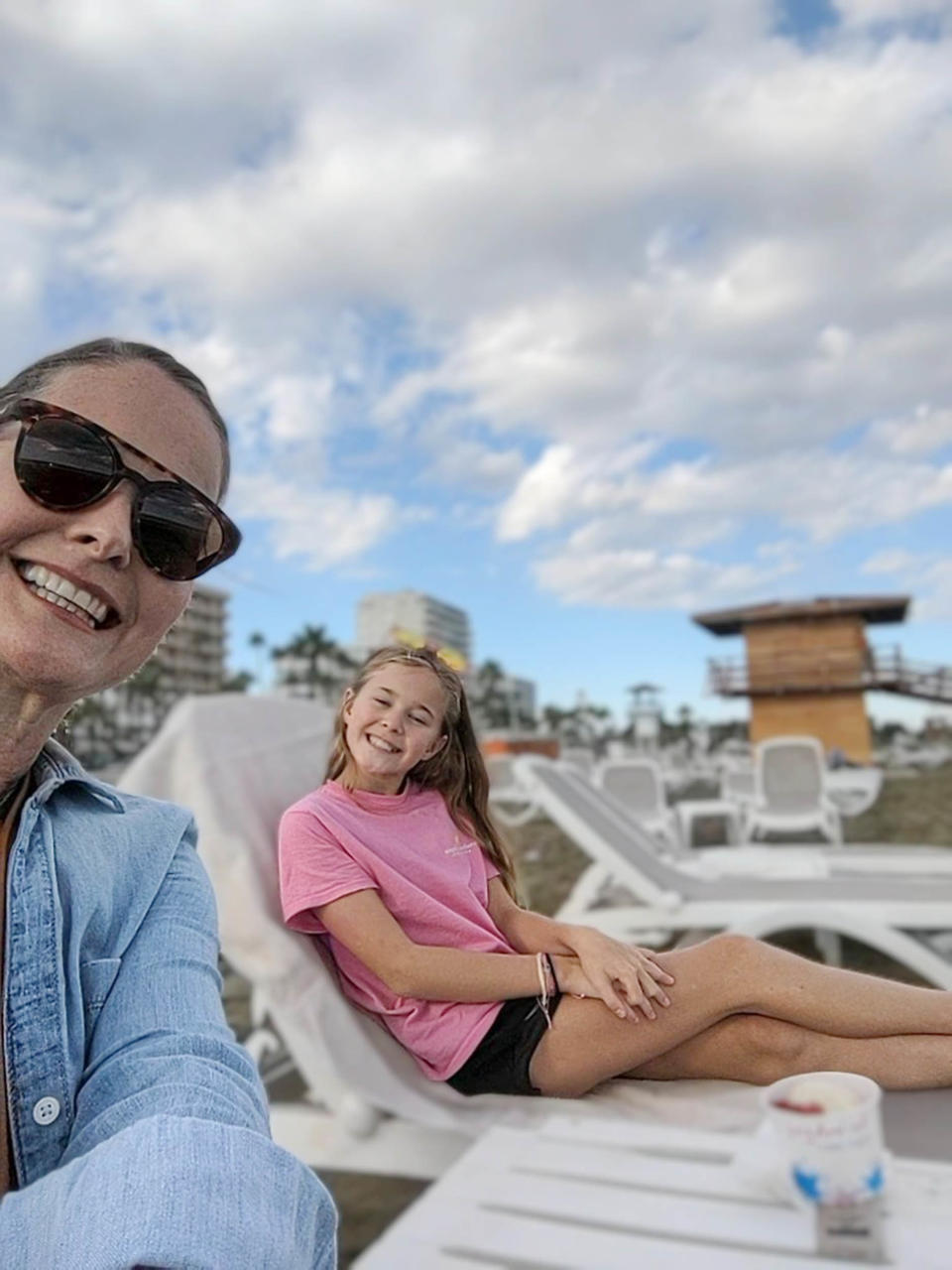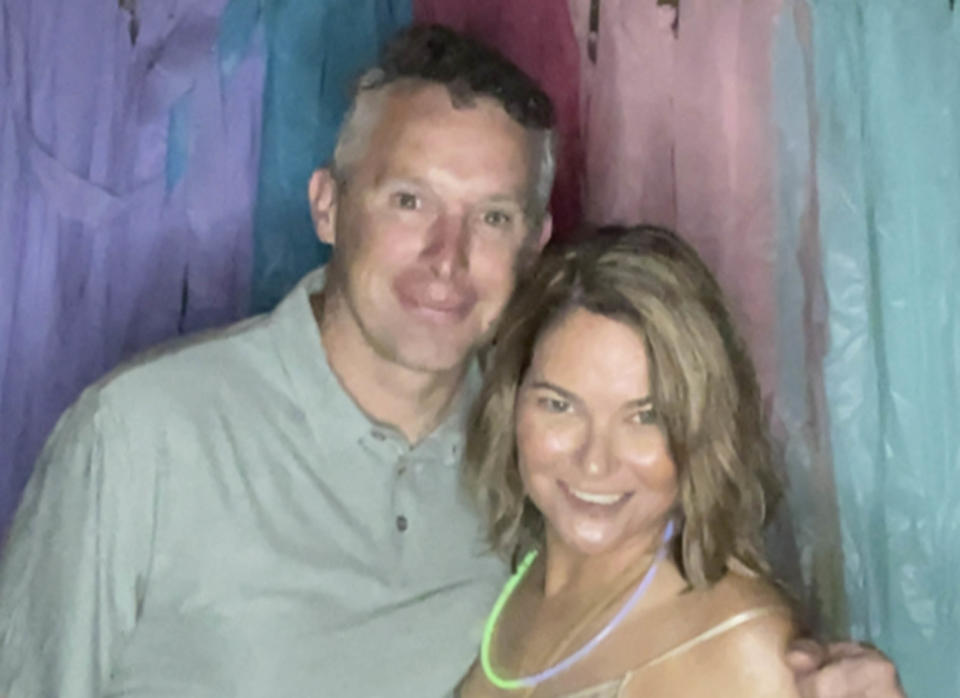My chronic illness isn't going away. Years later, I'm finally OK with that
Pamela Bishop, 47, of Knoxville, Tennessee, spoke to TODAY.com in 2022 about her experiencing having long COVID, and how it forced her to retire from her position as a director of a research center at 46. At the time, she was fighting for treatments, but in the year that has passed, something has changed for Bishop. She told TODAY about the new outlook she has on her health struggles.
In some ways, nothing has changed. I’m still sick. But in other ways, I’m in a much different place.
Last year, I was mourning what I had lost, the life of “active mom.” At the time, I was constantly fighting for treatments, and I tried everything that even offered a sliver hope. Among the treatments were myriad experimental and off-label medications and supplements, and treatments such as physical therapy, cognitive rehab and psychotherapy. I traveled to Europe for an expensive therapy called H.E.L.P apheresis, an experimental procedure where blood is removed from the body and “washed.” At first, I think it made a difference. For six weeks, almost all my symptoms disappeared except for my brain fog. But then it all came roaring back.

After having a COVID-19 infection in December 2020, I developed long COVID and what’s thought of as neurological long COVID, in particular. I have the trifecta, which is postural orthostatic tachycardia syndrome (POTS), myalgic encephalomyelitis/chronic fatigue syndrome (ME/CFS) and mast cell activation syndrome (MCAS). All three share overlapping symptoms while each one has some unique signatures. POTS makes me feel dizzy, ME/CFS causes post exertional malaise — meaning every action has an energy cost — and MCAS behaves like really bad allergies. Though, this is an over-simplification of what each one truly does in the body. To receive each diagnosis, I had to research them and bring my research to my doctors to show my symptoms matched the condition.
Retiring at an early age and grappling with so many health issues was exhausting, and I started therapy. At first, I spent much of my time crying and grieving my losses. My therapist mentioned the idea of acceptance and that felt impossible to me. How could I accept this horrible fate? For two years I experimented on myself, trying so many medications and therapies. A study would be published about something that helped a few people with long COVID or ME/CFS or POTS, and I'd feel hopeful and try it. But then it wouldn’t work. It sparked a vicious cycle — every time there was a new treatment, I feel hope. Then it failed and I felt depressed and discouraged. On top of it, these therapies often were costly.
Then I decided to stop treating myself as a guinea pig. I wondered if I was giving up. But I didn’t feel like I was. I didn’t feel suicidal or like I wanted to die. I just simply did not want to fight anymore. It was difficult. My whole life, I fought for what I wanted. As a professor, I fought hard to start my own research center. But now I was letting it all go.

I told myself I was going to simply be sick, and this was my life. No longer would I pour money and hope into some treatment that wouldn’t help me. There are no established therapies for long COVID. I felt like I had nothing to say to my therapist anymore. I wasn’t scared. I wasn’t upset. When I spoke with her recently, I told her I didn’t understand what I was experiencing. I didn’t feel depressed and didn’t want to withdraw from life, but I didn’t want to fight. She looked at me and said, “That’s acceptance.”
By accepting that I am sick, though, I have also embraced joy in life. Long COVID means I have very little energy for most things. Searching for cures and fighting against being sick consumed so much energy. Now I can devote myself to my family, to my container garden, to watching and nurturing my chickens. When I have good days, I embrace them. When I have bad days, I rest. I don’t enjoy being sick. But two and a half years into it, I know this is my life. It’s not the same as it was before I became ill, but I’m making this life work. For me, acceptance has taken some of the power away from the illness and given it back to me.

Having support from my husband and children helps me a lot. Sometimes my daughter doesn’t get it. She’s 12 and this is tough for her to understand at times. It’s harder, too, because I can’t predict when I’ll feel good or not, which means I can’t always be present. But accepting my limitations, not just fighting them, helps me be a better parent.
Living with a chronic illness involves a lot of planning. Say one of my children has a sporting event that I want to attend. I rest all day so that I have enough energy to attend and enjoy it. Even activities like showering and dressing can take a lot of effort so I have to be careful. People with chronic illness, especially ME/CFS, talk about spoons when describing how they use their energy. Everyone has a set number of spoons each day. If you use up all your spoons too early, you can’t do something you enjoy. I need to be mindful of my spoons and when I use them.

This allows me to experience happiness, though. I’m living around the illness and finding joy instead of fighting and searching for that thing that will make me better. POTS, ME/CFS and MCAS have no cure and often no effective treatments either. I hope that this will change in the future. But for now, I’m living with the illness.
This interview has been edited and condensed.
This article was originally published on TODAY.com

